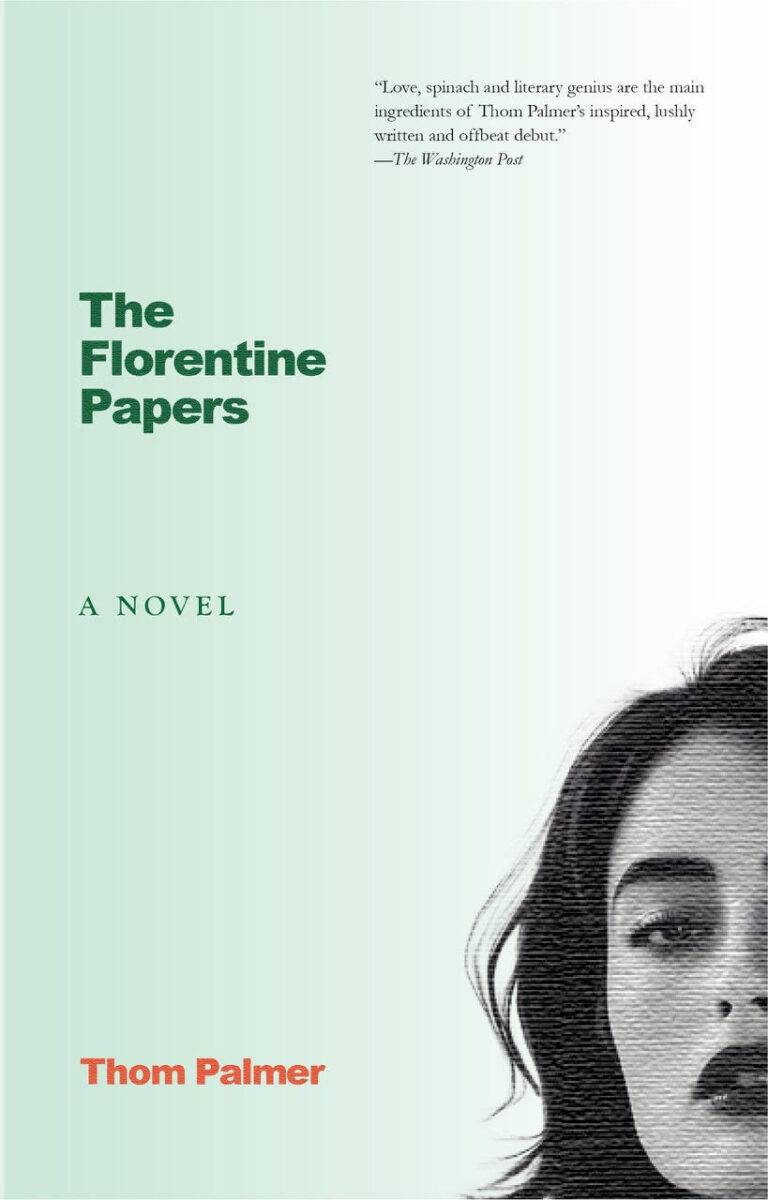“Thom Palmer’s richly imagined first novel offers a hilarious yet bittersweet examination of food, art, and love…”
From the Publisher: “When The Florentine Papers, by lifelong Pittsburgher Thom Palmer, was originally published in 1991, critics were rapturous. ‘Love, spinach and literary genius are the main ingredients of Thom Palmer’s inspired, lushly written and offbeat debut novel,’ said the Washington Post.
After decades out of print, The Florentine Papers is back in a new edition from Tivoli Books (174 pages, $16.95, ISBN 978-1-966218-00-5). Thom Palmer’s richly imagined first novel is a hilarious yet bittersweet tale of food, art, and love. Set in San Francisco, it’s the story of a struggling poet whose life takes a dramatic turn when he falls in love with enigmatic young Maria Perpetua, a brainy and seductive food writer composing an encyclopedic masterpiece on spinach. Their ill-fated romance, and the consequences of her sudden rise to cult fame, form the basis of a mock memoir related in a highly original fictional voice. Funny, strange, and poignant, The Florentine Papers is a sumptuous feast of food and language, a book Donald Harington called ‘our first great gastronomical novel.'”More info About the Author: Thom Palmer lives and writes in Pittsburgh, Pennsylvania. The Florentine Papers is his first novel. He is also the author of a second, Desire.
“Love, spinach and literary genius are the main ingredients of Thom Palmer’s inspired, lushly written and offbeat debut novel.” —Chris Patsilelis, The Washington Post
“With a connoisseur’s attention to the delights of food and love, Palmer handles language in his first novel the way a gourmet cook uses ingredients in an inspired recipe.” —Publishers Weekly
“A lush narrative that brings to mind a Julian Barnes or Anthony Burgess . . . An original magical mystery tour that stakes out its own peculiar portion of the comic universe.” —Kirkus
“A talent to be reckoned with, an heir to Nabokov, a dazzling wordsmith to watch and possibly to adore. This is a compelling book, a stunning romp through untracked territory: our first great gastronomical novel.” —Donald Harington
“A playful and exuberant feast of language.” —Benjamin Hale
“Palmer leaves us with the taste of rue seasoned with laughter.” —Michael Harris, Los Angeles Times
Chapter One
During the months of research and composition pursuant to the much-heralded publication of Maria Perpetua’s Spinacea oleracea, it was I who was her tester and taster and muse. Maria said to me more than once that a muse is really just a polite euphemism for a paramour. So be it. I am the motivational and inspirational whore behind that book of spinach. There were times when I had enough iron coursing through my system to forge a battleship’s hull. I nibbled enough quiche and gobbled enough eggs Florentine—embellished with Maria’s rhapsodic, peerless hollandaise—that arteriosclerosis nightmares fuddled and confounded my sleep. The innumerable hours spent categorizing her countless three-by-five note cards, or allowing myself to be seduced when her experiments with purees filled her with an inexplicable prurience, caused my own work—an epic poem on Vietnam—to grind to an immutable halt.
The dedication, “To Popeye, mon ami,” is not just another tongue-in-cheek element of this jeu d’esprit, though admittedly her work is full of arcanum and recondite asides that the nescient gourmand-belletrist would pooh-pooh as so much excelsior. Those in the know will tell you that this deference to the cartoon character is really a reference to me—a halfhearted one, I might add—not because I smoke a corncob pipe or because my forearms in any way resemble his, but because throughout the book’s gestation, for five days out of seven (Maria generously desisted on weekends), I could honestly say, “I eats me spinach.” Yet, despite the unstinting investment of my time, sanity, fully equipped kitchen, and circulatory system, I am not one whit better off than I was four years ago. Contrarily, my midsection is greater and my emotional state, always a tad delicate, is more friable than ever.
You must think, then, I write out of greed, but I assure you that, having waited so long to do this, the remuneration I’ll now receive will be but a fraction of what I could have had, had I turned a deaf ear to my conscience and responded to the plethora of entreaties I received several years ago, when Spinacea oleracea was in its first immense printing. If ever there was a lucrative time to compose this document, it would have been then, when Maria’s book, despite its imposing title and snooty, dilettantish air, was bobbing atop the best-seller list with the irrepressible buoyancy of a beach ball. Accompanying the frenzied sale of the book were the rumors and speculation surrounding its authoress, about whom next to nothing was known. With a quirkiness that was the cornerstone of her eccentricities, Maria had decided that she would remain utterly reclusive, passionate about her privacy. Photographs for the book jacket were indeed taken; I went through the elegant and rather flattering proofs with her. But she rejected all of them and chose total self-effacement. Her reasons for this, I believe, were two-fold. The first was attributable to her fear and abhorrence of the glaring, corrupting limelight, a graceless state that she believed to be the exclusive property of the mediocre and the plebeian. The second was her shrewd sense of marketing; beneath that erudite, artistic veneer was a woman who could sell anything. She felt that, should the book’s popularity begin to wane, the inaccessibility of its enigmatic authoress might prop it up a few months more.
But I chose silence, even though I was at an emotional low and particularly susceptible to the petty sirens of avarice and revenge. I patiently kept my attention on my own work, that was my only concern then and is my only concern now. You see, I am not writing this for the temporal salve of a bloated check from a major magazine, nor is this a vengeful poultice to soothe the lesions I acquired upon the dissolution of our relationship. This is merely a personal cleansing: I write now to rid myself of the nasty ghosts that still people my dreams, to flush out the obstructions that have devilishly lodged inside me. At one time a fruitful poet, my creative faculties slipped into a cruel coma somewhere between “Spinach Magnificat” and “Legumes et epinards Provencal” and have remained that way. I cannot continue in this manner. I give you, then, this unexpurgated chronicle.
This excerpt is published here courtesy of the publisher and should not be reprinted without permission.

























